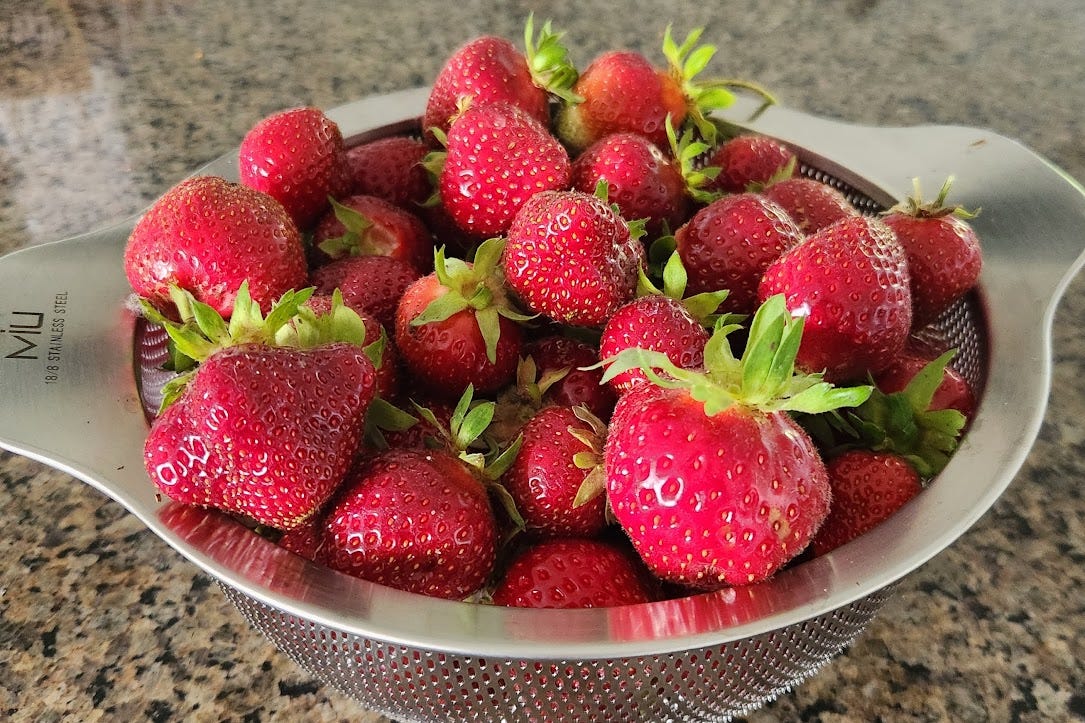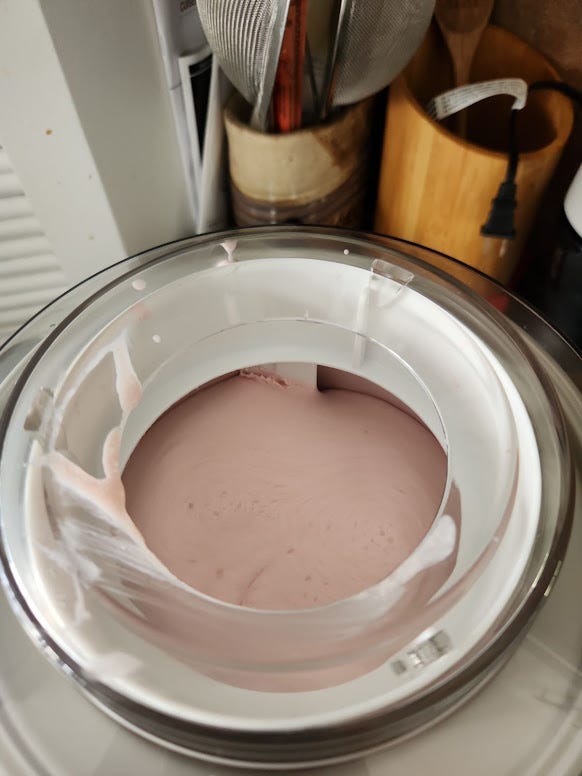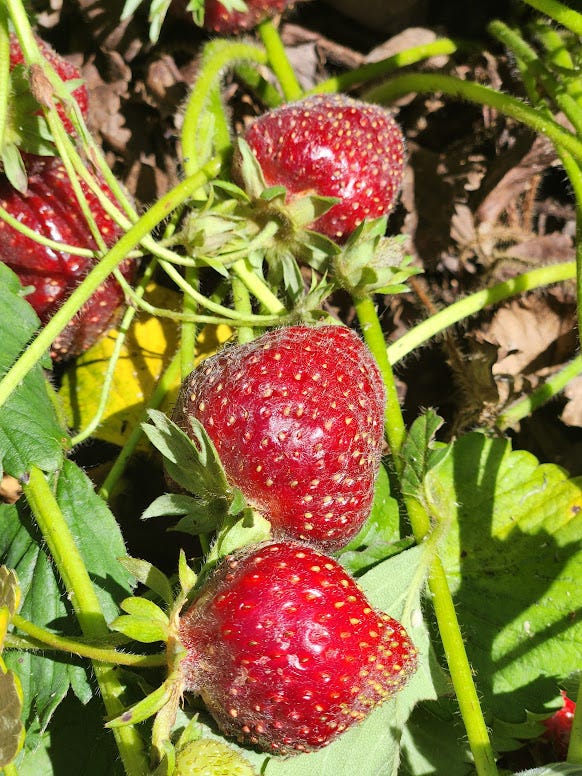Longtime attentive readers of Taking Bearings will know that when The Wild Card comes around it is hard to predict what I’ll write about. (Even for me.) This week’s newsletter is a bit shorter than normal but includes a link to something longer that I wrote for another Substack (that I hope you’ll read).
I’ve been thinking about berries, and they are winding their way into several areas of my life lately. Read on!
Gardens
I’m not the gardener in my family, but I appreciate the gardens that have been part of my life. That has grown as I’ve aged.
As a kid, I associated our large garden with work—planting, weeding, snapping beans, weeding. I remember enjoying carrots fresh from the ground with a little dirt still on them. I liked what corn looked like standing tall. And the pumpkins were great, especially the year or two when I sold them at the end of our driveway for a tidy profit.
My spouse loves gardening, although I often find her method inscrutable. She has joked for years about writing a book called, Gardening without Effort. It’s obviously a misnomer; she puts in plenty of effort. But our home gardens have resembled—at least to my eye—wild tangles of plants in random places, constantly shifting from this bed to that. There is a method to her work, I’m assured, but I cannot discern it and have stopped trying. Fortunately, she makes plants grow in abundance, and the pollinators and I are grateful; we benefit from colors, beauty, and food.
Transplants
We moved to this home in late 2021 and had to figure out where to garden. The previous owners had a tiny spot, hidden away on the north side of the house, where they grew a few things, among them strawberries and rhubarb, still hanging on.
We started transforming our yard into a garden and transplanted the remaining one or two rhubarb plants and the dozen or so strawberries, hoping they’d survive. They did.
And spread.
This summer we have seen the largest leaves on our rhubarb plants. And we estimate more than fifty strawberry plants are now scattered across our garden beds. The berries came in bunches this year. We have made four batches of homemade strawberry ice cream, have had snacks by the handful, and frozen some for treats later. It’s been a berry bounty.
Simple, but Still Miraculous
Last week when I was loading up what is likely our last big harvest I was struck by the simple miracle of growing food.
I picked a particularly large, deep-red berry and ate it. The flavors flooded my mouth, and I was briefly astounded that I was eating this good strawberry that came out of soil from our yard, nurtured by sun and rain and a small bit of attention.
Most food we eat is just this simple. And complicated. Something is put in the ground. Some care—more or less effortful—is given it. Nature takes care of the rest. Sometimes that means bugs or weather turns things upside down leading to more efforts or less harvest, of course. Compared with the work I have to do to produce a story or an essay or a book, this seems almost magical.
I understand, obviously, that eating single strawberry is not like feeding the world. Getting sufficient food in the right places so people don’t starve is far from simple. And it requires vast amounts of labor and resources. I do not mean to imply otherwise or denigrate the efforts of farmers and others in the food system.
But the basic work—plant a seed, nurture it, harvest, and eat—is amazing.
When you garden, you can be reminded of that simplicity. Taking the time to notice this, or if you don’t garden to think about the process that gets your food from soil and sun to your bowl might be worth doing more often than most of us do.
Other Berries
A while ago, I was invited to contribute to another newsletter. It was a generous offer, and I accepted. I didn’t know what I would write about. Trust is a big part of my writing practice.
When reading Rural Hours for last week’s newsletter, I read about berries and other fruits that Susan Fenimore Cooper’s neighbors, or passersby, stole from local gardens. My mind spun into associations. That’s another big part of my writing practice.
Soon, I had written a short essay about huckleberries and the price of pricing everything, or the value of giving things freely. You can read “Reclaiming Huckleberries” at
by clicking below:It is a little longer and more substantive than what I often produce here.
Closing Words
Relevant Reruns
Since I’m musing about growing things, here is an earlier newsletter about one method for farming better that feels relevant and another one about the origins of USDA Organic standards. I’ve written about huckleberries before, in this essay and the beginning of this book.
New Writing
Speaking of berries, I wrote a profile of a local berry farmer that is now posted. Other things are in the works, so pay attention in coming weeks.
As always, you can find my books, and books where some of my work is included, at my Bookshop affiliate page (where, if you order, I get a small benefit).
Taking Bearings Next Week
Next week, I’ll head back to The Classroom. Stay tuned!








Strawberries! Monday night I had dinner with two of my parents' oldest friends, retirees living on a hobby farm in the Willamette Valley, and talk turned to strawberries. And in particular to the terrible quality of the commercial berries in the market, especially here in Minnesota. From there, inevitably, I recounted stories (our adult offspring were there) about being "forced" to pick berries as a summer job as a child. Back then-- late 1970s --it was the thing you did in summers in the mid-Willamette Valley: made your kids pick berries commercially. Legally, as I recall, we had to be 12 to pick but most of us started at 9-10 and were simply told to lie if anyone asked how old we were. Kids would be assigned to "platoons" with adult organizers and were transported by public school busses to the fields; I had to be at the bus stop at 630am Monday-Saturday and was usually dropped off around 3:30pm. A "full day's work" might earn a kid like me $2-3, or a really good child picker twice that. The migrant farm labor we shared the fields with would earn 10x what we did but of course they worked much harder and longer hours, even those most were also supervising their own kids as well. Those fields of Oregon strawberries are long gone now I understand, and it's probably been decades since hundreds of schoolchildren were disgorged from busses on a daily basis to help with the harvest. But every time I see a ripe berry I think of how it felt to walk in them all day, have my hands stained red, and learning to hate the taste of strawberries all over again every June as the crop came in. Someone should write a book about the history of youth agricultural labor!